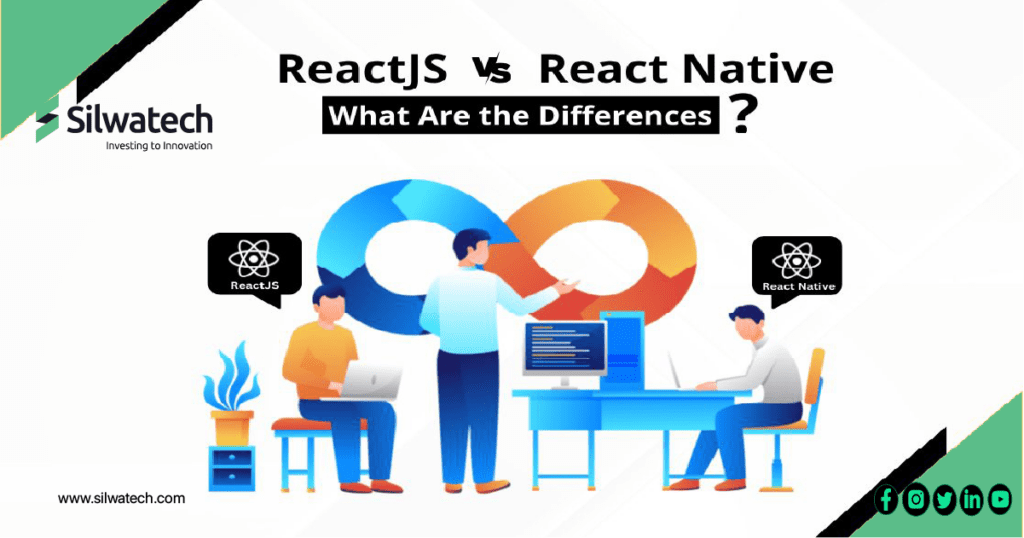ReactJS and React Native are two similar-sounding names that lead many to believe they are the same. Let us put this confusion to rest with this guide.
React JS was launched in 2013 by Facebook as a web application development framework. React Facebook launched native in 2015 as a mobile app development framework. Both frameworks are extremely popular and hold a significant market share.
Although they have a lot of similarities at their core, some differences set them apart. Read on to learn what they are, their features, and the advantages of using them to build an app.
What is ReactJS & Why Businesses Choose ReactJS for App Development
ReactJS, also called Reactjs or React.js, is used to build single-page web and mobile applications. It runs on the JavaScript library and is actively used by organizations of all sizes to run their web apps. It is used to create apps that have a dynamic and interactive user interface. It is highly popular among developers and is playing an essential role in the front-end ecosystem
Popular web apps like Facebook, Netflix, Instagram, Dropbox, Whatsapp etc., are run on ReactJS.
Here are some reasons businesses looking for a web development framework readily choose ReactJS.
Speed
React JS uses Document Object Model or DOM. This feature helps create in-memory data structure caches that analyze the subsequent difference and updates the DOM displayed on the browser seamlessly. It also allows developers to write code as the complete page is rendered with every change, but only those components are rendered with change This speeds up the web and mobile application development process, making it a preferred choice for businesses.
SEO Friendly
If you are using React JS for app development, it also has the advantage of boosting its SEO. It enhances its organic traffic thanks to its server-side rendering. Caching and logging the same content can happen more quickly when a Google bot visits a server that has already rendered images and content. React JS also has an inherent speed that decreases the page loading time. This helps when the Google bot directly logs the content from the server side.
Stability
Stability is crucial to a fruitful development process. React JS has a stable core that uses downward data flow. It takes a lot to shake things up in a React JS development process, as it has unmatched stability and user-friendliness, which makes it a preferred choice for businesses. The other elements remain unchanged even when the developers change the app’s structure. This allows developers to make changes as they proceed with the development.
Community Support
The booming popularity of React JS ensures that you are well supported by a huge community of developers who use it. There is a large ecosystem for component libraries, web browsers, code editors, tools etc. Especially since it is backed by the tech giant Facebook, there is always a large and active community of React JS users.
What is React Native & Why Businesses Choose React Native for App Development
React Native is a framework in JavaScript that is used for writing real, natively rendered mobile apps for iOS and Android operating systems. React Native is based on React, Facebook’s JavaScript library for building user interfaces. However, unlike React JS, which is for the web browser, React Native targets mobile platforms.
A JavaScript library familiar to developers can now be used to write mobile apps that feel and look ‘native’. The code can be shared between platforms, allowing developers to make for both iOS and Android simultaneously.
Let us now look at what makes React Native a go-to option for business mobile app development.
Platform-specific code
When building cross-platform apps, developers prefer to reuse as much code as possible. With React Native, you can organize and separate code by the platform using the platform module or platform-specific file extensions. React Native provides a module that detects which platform it is being run on automatically. This greatly helps the development process, as developers can reuse as much code as possible, making it faster for businesses to develop and roll out apps.
Cost Efficiency
React Native provides the option for code reusability. What this means for business is that the need for two teams for different platforms is cut down. A single code can be used for both platforms. A single developer team can create the app for both platforms. This can cut down costs by up to 40%.
Live Reload
This feature in React Native allows developers to see the changes as they work in real-time. This also lets developers make changes to the code while the app is loading. The changes can be seen in the app with automatic reload. This can be applied to the full application or parts of the application, which can be reloaded to update the changes.
Smoother UI Experience
React Native uses a fast and responsive React JavaScript library to build app interfaces. It uses a component-based approach, making it easy to create UI designs that are complex and simple, thanks to its rendering abilities. It has many component UI libraries, making it easy to deliver a smooth UI experience to its users like Expo, Shouten, etc. This allows you to focus on your business ideas, saving your team from creating them from scratch.
Differences Between Both
Now that we have got an idea of what React JS and React Native is, let us not compare them to find some of the differences between them.
The Installation Process
React JS: React is a JavaScript library, so the installation process is quite simple. Simply integrate the React library in the HTML page in the <script> tag, and we are good to go.
React Native: The installation process in React Native is much more complex. There must be a development environment like Android Studio for Android or Xcode for iOS to develop an app using React Native. The developer would also need other tools like Node, the React Native CLI, JDSK Watchman, etc. A new project can be created in the React Native Command Line Interface and executed.
Efficiency
React JS: React JS executes apps on the client-side server while rendering on the server side. This improves the developer’s efficiency, giving them more options while creating fundamental abstractions. This way, its efficiency is maximized.
React Native: React Native improves efficiency through its reusable native components. With reusable native components compiled directly to native code, the app will have the functionality, appearance and user experience of a native app.
Technical Know-how
React JS: If you are familiar with JavaScript, you can easily handle React JS. This is because React JS is just a JavaScript library. If you are familiar with technical documentation, you can become a developer in React JS.
React Native: React Native is not simply a JavaScript framework but a combination of Java, Objective-C, Objective-C++ and C++ code. A developer needs a fair knowledge of all these to build an app in React Native.
Compatibility
React JS: React JS is SEO friendly in that it renders on the user-side server using Node, making it apt for web browsers.
React Native: React Native is meant to develop mobile UI. Hence it is highly UI-driven. React Native, in this aspect, works like a JavaScript library rather than a framework. This gives the apps a highly responsive UI and smoother, faster loading times.
Components
React JS: As a component-based library, React JS has two different components: functional and class components. The functional components allow developers to write less code yet create apps with great performance.
React Native: React Native has native modules and native components. The Native UI components are ready-to-use widgets. You can also create custom components to reuse within the app. Native Module refers to a set of JavaScript functions that support platform API.
Ready to Hire a Leading React.js Development Company?
Creating a mobile or web app offers a competitive edge to businesses. But to reap the true benefits of app development, you need the assistance of an expert development team. Whether you hire a React JS or React Native app developer or a React JS or React Native app development company, it should give you the best returns on your investment and set your business ahead in the race. If you are looking for ROI-driven React Native app development services, we have the right solution for you. At Silwatech, we are a reputed React JS web development company that has been creating excellent outcomes for our clients for over two decades. When you hire us, you get an experienced and battle-tested software development team with a track record of providing unparalleled services worth every penny you spend. Contact us today!




















